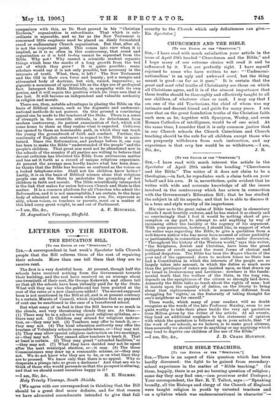SIMPLE BIBLE TEACHING.
[To THE EDITOR OP THE "SPECTATOR."] SIR,—There is an aspect of this question which has been hardly discussed : the light to be gained from secondary- school experience in the matter of "Bible teaching." (In them, happily, there is as yet no burning question of religion; some day they may find one,—iam proximus ard.et Ucalegon.) Your correspondent, the Rev. R. T. Talbot, says :—" Speaking broadly, all the Bishops and clergy of the Church of England were taught religion in youth by untested teachers and on a syllabus which was undenominational in character"- (Spectator, May 5th). Will you allow me, as one who has all his life taught, and frequently examined, in very various types of school (primary or secondary), to point out certain qualifying considerations ?
(1) It is true that the Scripture teaching in public and grammar schools is largely "undenominational." But as nowa- days few, if any, masters teach it against their will, we may believe that the conditions suggested in the Lower House of Convocation (Canterbury) are fulfilled in those schools,—viz., that their teaching represents "knowledge and personal convic- tion." The Education Bill must be amended in that direction to satisfy religious people.
(2) Speaking broadly of the public schools and grammar schools endowed for the promotion of "true religion and sound learning," we must never lose sight of the fact that the Scripture teaching has a denominational background. The chapel with its services and sermons and yearly call to confirmation, the school prayers, the presence of ordained masters, the respect for Church seasons, all go to create an "atmosphere." At all events, it is misleading to argue direct from public-school undenominational teaching to that proposed in elementary schools under the (3) Our secondary schools will provide numberless examples of the careful study of the books of the New Testament, with the use of commentators such as Bishops Lightfoot and Moule, who do not stand for undenominationalism. But the " syllabus " in those schools is generally determined by a large-minded Head- Master, working in sympathy with such examining bodies as the "Joint Board." When a syllabus of "Bible Christianity" is drawn up for our elementary schools by some national (not local) Board, which we can trust as consisting of experts, we Church- men shall be less sceptical about its Christian character.
The Bishop of Birmingham, and no less Canon Wilson, has laid down a principle which is axiomatic for Church people,—that no teaching of religion is effective which does not bring the child into connection with the religious community. It is amusing to find my friend, the Rev. Dugald Macfadyen, claiming this as a Free Church principle, apparently borrowed by Sir W. Anson for an occasion. As well say Aristotle was a Free Churchman when he defined man as a "political animal"! The fact is, if Church- men and Nonconformists are agreed on this principle, surely it passes out of the region of sectional principles and becomes universaL And we are right to insist that no educational settle- ment will endure which disregards it. But Mr. Itracfadyen's letter (setting aside his somewhat florid epithets for things Anglican) contains something which the advocates of religious peace may welcome. The distinction between dogmas and exclusive dogmas is suggestive. But we Churchmen must know on which side of the line the divinity of Christ is going to be placed before we commit ourselves to the concordat which so many of us earnestly desire. Can we be sure that the local authority will place it where Mr. Maefadyen places it ? Surely, Sir, when you propose to hold the Church responsible in the event of the schools being secularised, you are giving her something less than the sympathetic justice which Churchmen have always looked to receive from the Spectator.











































 Previous page
Previous page